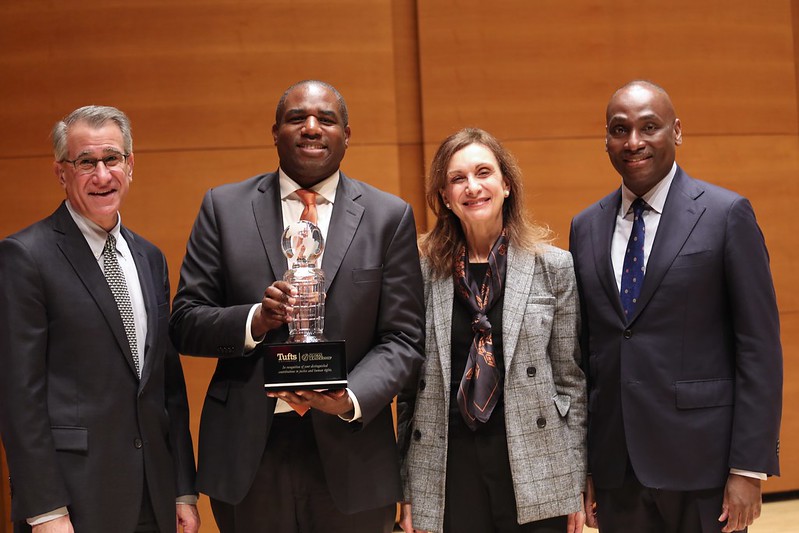
We must always distinguish between Putin and Russian people: David Lammy
By Vishal Manve, MALD 2023 Candidate, The Fletcher School
On March 31, 2022, Tufts University’s Institute for Global Leadership conferred the Dr. Jean Mayer (1993) Global Citizenship Award to David Lammy, Labour Member of Parliament and Shadow Foreign Secretary for the United Kingdom. Mr. Lammy addressed the current situation in the West concerning Russia’s invasion of Ukraine and other crucial geopolitical developments. Mr. Lammy is the author of Tribes: A Search for Belonging in a Divided Society.
Accepting the award, Mr. Lammy expressed gratitude and shared his first exposure to Massachusetts, U.S. politics, and the constitution when he studied at Harvard Law School in the late 1990s. Commenting on American and global democratic processes, he reiterated, “Democracy will always be a work in progress.”
Further outlining the ascent and ebb of democracy, Lammy mentioned how the “march towards the 21st-century future was filled with hope” but was marred by the global financial crisis of 2008 and other events on an international scale.
As the Russian invasion of Ukraine continues despite global condemnation and crippling economic sanctions, Lammy explained the rise of right-wing politicians including Nigel Farage, Donald Trump, and Marine Le Pen, and the subsequent attempts by illiberal leaders, especially Russia’s President Vladimir Putin to “exploit vulnerabilities through barbaric and illegal invasion of the sovereign country of Ukraine.”
“Under the fog of disorder, Putin thought he could act with impunity in invading the sovereign nation of Ukraine. 141 countries and the United Nations General Assembly voted to condemn Putin’s war of aggression and this is not the moment to be complacent,” Lammy added.
Further reiterating how the Russian attack changed the security framework in Europe, Lammy added, “European geopolitics was changed by force and threats including nuclear threats.”
Lammy added how the images of tanks rolling into Ukraine amid the invasion reopen and exacerbate previous sounds for many Europeans, especially from the world wars. He further expressed how the world has changed ‘forever after the events of the invasion’ resulting in the re-calibration of policies on energy security by the EU.
“It is a war of Putin’s making. Many in the EU had believed the era of war was over. Zelenskyy has called upon our collective global conscience and showed us what it means to fight for a democratic state,” Lammy said.
Reiterating the urgency to decarbonize the global economies, Lammy further added how Europe and other markets must reduce dependency on Russian oil and gas and focus on net zero emissions in the near future.
“We should sprint towards decarbonization. Fossil fuels empower the worst dictators across the world and we must ensure we restore our soft power,” Lammy added.
On the economic front, Lammy added how China, not Russia, was a ‘serious competitor’ to the West.
“We need a patient long-term strategy and to equip ourselves for confrontations. Confront not just Putinomics but its imitators around the world. Dictatorships are controlled by one bad actor in isolation,” Lammy stated.
On dictatorships, Lammy outlined how they comprise a network of illicit finances, security services, and misinformation, and are unified by a particular ideology to enrich themselves at ‘whatever cost’.
“To counter these, we must ditch our short-term approach to energy, economics, and politics,” he added.
On the Cop 26 outcomes in Glasgow, Lammy further stated how the world should have gone further in mitigation and adaptation efforts to reduce the impact of climate change.
“We are living in a period similar to the run-up to the first world war. This is a multi-polar world and we have to focus on common interests, values, etc,” he added.
On the issue of India’s relationship with Russia amid the invasion, Lammy spoke on how the South Asian giant could reconsider its strategic relationship after witnessing the obliteration of Russian tanks and weapons on the ground. India imports 46 percent of its military supplies from Russia.
“India is a great democracy and an important one in the global community. India might be reflecting on their proximity to Russia for so many years,” he added.
On the role of universities like Harvard or Tufts, Lammy spoke on how diversity in these institutions creates a conducive environment for research, social analysis, and the culmination of ideas.
“Universities like Tufts are great because they bring together experts from different disciplines. They bring together a theorist, a scientist, a social scientist or people from different socio-economic, religious, racial, or gender spectrums and the consequences are rich and varied,” he added.
Lammy is known for publishing the Lammy Review report that focused on the UK criminal justice system and sought additional scrutiny of data concerning ethnicity and religion with a focus on moving towards fairer treatment of individuals from ethnically minority communities.

